Forming the Whole Person: Academic Mentorship in a Great Commission Community
Chad Burchett | March 31, 2023
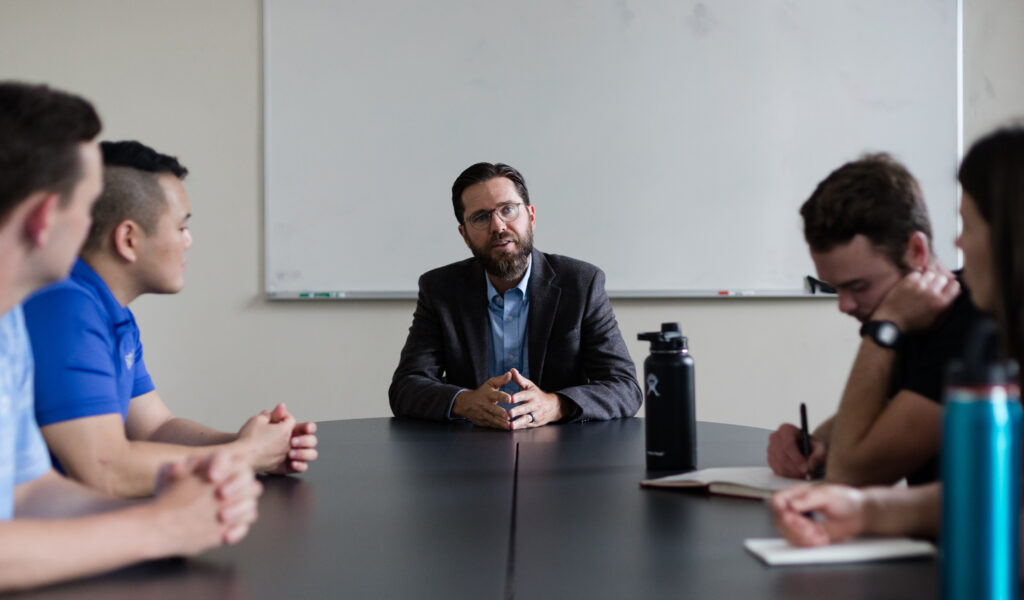
For Ross Inman, associate professor of philosophy at Southeastern Seminary, mentoring students involves much more than lecturing. It is living life-on-life with his students, investing in their intellectual and spiritual formation in the classroom, at his office, and in his home.
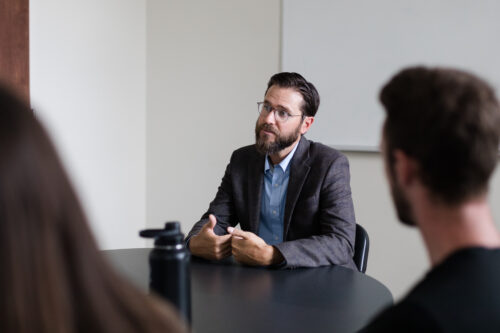 Developing this vision for academic mentorship during his time in college, Inman learned firsthand the formative role professors can play in a student’s life. His own relationship with professors inspired him to pursue teaching.
Developing this vision for academic mentorship during his time in college, Inman learned firsthand the formative role professors can play in a student’s life. His own relationship with professors inspired him to pursue teaching.
“The reason I got into teaching in the first place was to come alongside people in their formation, living life with them and discipling them both inside and outside the classroom,” recalled Inman. “That was the kind of teaching that deeply impacted me in college, and I recognized that it could be such a powerful ministry — the kind of ministry that I wanted to be a part of in other people’s lives.”
The reason I got into teaching in the first place was to come alongside people in their formation, living life with them and discipling them both inside and outside the classroom.
When he became a professor, Inman put into practice this life-on-life approach to mentoring, challenging students to not only seriously study and apply what they were learning but also intentionally develop godly character and a vibrant devotional life.
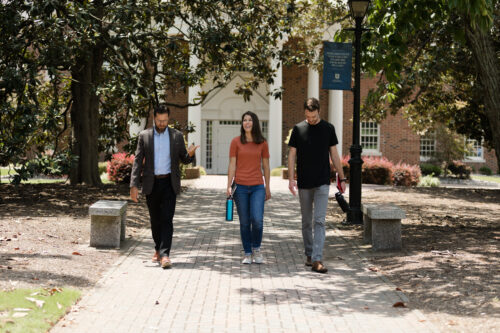 When Caden and Jessica Farr enrolled in Inman’s undergraduate Enlightenment course in 2015, they were struck by how seriously he was committed to the life of the mind and to applying what he taught in the classroom to his everyday life.
When Caden and Jessica Farr enrolled in Inman’s undergraduate Enlightenment course in 2015, they were struck by how seriously he was committed to the life of the mind and to applying what he taught in the classroom to his everyday life.
“What stood out to me was that he expected excellence from his students,” recalled Caden. “While he was gracious, he really pushed us to work hard.”
When it came time to take philosophical anthropology, Jessica was excited to take the class with Inman because she valued his ability to take complex concepts and demonstrate their real-life implications.
“Dr. Inman helped me to see that philosophical concepts have beautiful and important implications for everyday life,” recounted Jessica. “He would bring news headlines into class and help us to see that what we were discussing really mattered.”
Dr. Inman helped me to see that philosophical concepts have beautiful and important implications for everyday life.
For graduate student Chris Lee, Inman was his first philosophy professor, and because of Inman’s influence, Chris developed a deep passion for Christian philosophy.
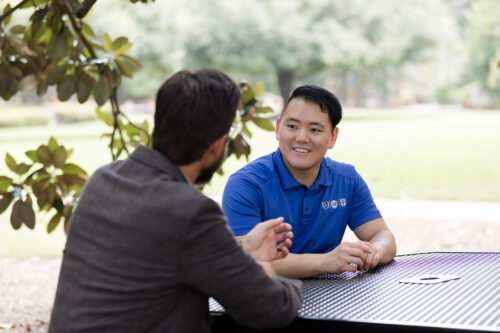
“You could tell that Ross was a master of his discipline, and he was able to communicate challenging concepts in a way that made sense,” Chris recalled. “He helped me to ask probing questions, to define terms properly, and to connect concepts to real-world issues. He also helped me to see that philosophy should always be subservient to Scripture.”
Chris eventually became Inman’s teaching assistant, which only increased Chris’ eagerness to study and even teach philosophy.
When Inman accepted a teaching position at Southeastern in 2019, Inman did so because he wanted to teach in a space where he could do rigorous academic work within a larger framework and community of discipleship. He was deeply encouraged by Southeastern’s commitment to its philosophy program, by his fellow philosophy faculty, and by the L. Russ Bush Center for Faith and Culture on campus.
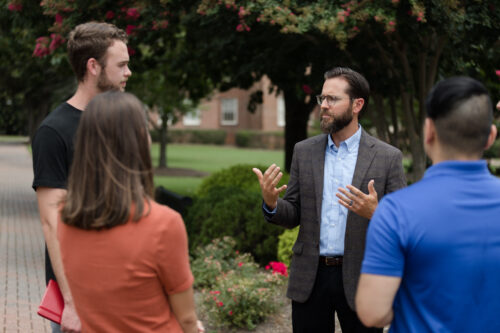 What was even more compelling to Inman was the emphasis Southeastern placed on the importance of the local church and holistic discipleship in service of the Great Commission — both of which resonated deeply with Inman’s own vision for mentoring students.
What was even more compelling to Inman was the emphasis Southeastern placed on the importance of the local church and holistic discipleship in service of the Great Commission — both of which resonated deeply with Inman’s own vision for mentoring students.
“Southeastern uniquely and remarkably balances a dual emphasis on breadth and depth, on North American and global missions as well as training pastors, church leaders, and missionaries to cultivate disciples in the local church context,” shared Inman. “I appreciate that the work we do here aims to equip leaders to fulfill the Great Commission in North America and around the world.”
“Southeastern’s culture also enables a deeply formative student-teacher relationship where there is a lot of room for mentorship and the pastoral aspect of education — consistent opportunities to invite people over to the house and invest in them personally,” added Inman. “For my wife, Suzanne, and I, this has made being here such an enjoyable experience. We can let our walls down in a healthy way and be ourselves here, welcoming students into our lives to see how we parent, how we work through struggles, and how we walk with God. This is an advantage in the classroom because I am personally connected to my students and invested in their discipleship outside of class. I get to teach the people we dearly love and pray for, and I get to watch them flourish as they serve the Lord.”
Southeastern’s culture … enables a deeply formative student-teacher relationship where there is a lot of room for intimacy, mentorship, and the pastoral aspect of education.
Having previously been shaped by Inman in the classroom, Chris, Caden, and Jessica followed Inman to Southeastern to continue their education. When they arrived, their relationship with Inman only deepened as they got to share life with him both inside and outside the classroom.
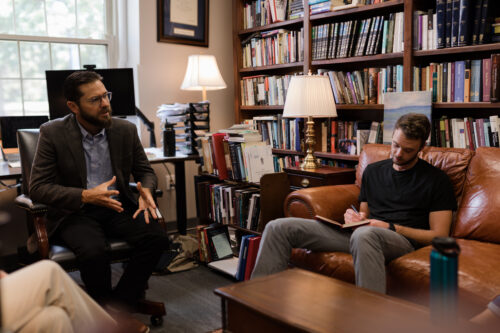 “As a student here, I have learned and seen from Dr. Inman how much teaching can be a rich context for discipleship,” commented Caden. “Shortly after I got here, Dr. Inman invited Chris, myself and a few other guys to meet weekly in his office at 7:00 AM to talk, read, and pray together. That experience has formed me so much and has deepened my prayer life as I’ve gotten to see Dr. Inman’s relationship with the Lord in class and in everyday life. I never would have thought that the man who taught me philosophy would be the man who taught me new ways to pray and walk with the Lord.”
“As a student here, I have learned and seen from Dr. Inman how much teaching can be a rich context for discipleship,” commented Caden. “Shortly after I got here, Dr. Inman invited Chris, myself and a few other guys to meet weekly in his office at 7:00 AM to talk, read, and pray together. That experience has formed me so much and has deepened my prayer life as I’ve gotten to see Dr. Inman’s relationship with the Lord in class and in everyday life. I never would have thought that the man who taught me philosophy would be the man who taught me new ways to pray and walk with the Lord.”
For Caden, walking alongside Dr. Inman in his spiritual journey has deeply formed him as a future teacher because he has learned that teaching is so much more than telling students new information. It involves demonstrating what he is teaching by the way he walks and by the way he models faithfulness to the Lord.
As Inman’s PhD student and grader, Chris has learned similar lessons in his seminars, but some of his most formative moments with Inman have happened outside the classroom: “In our meetings, Ross has shown me again and again that academics — though rewarding and profoundly important — are not the end all be all,” shared Chris, “There are more important things in life, and Ross has helped me to steward academics with that in mind. As I’ve hung out with his family, Ross has helped me to see that the posture in which I pursue education and career goals is as important as what I pursue.”
Ross has helped me to see that the posture in which I pursue education and career goals is as important as what I pursue.
The lessons Chris, Caden, and Jessica are learning in community at Southeastern are preparing them to make disciples. Because they have been intentionally mentored through their studies, they are being challenged to not only learn but also apply what they are learning and teach it to others. For Jessica and Caden, their training directly influences their ministry to youth at church.
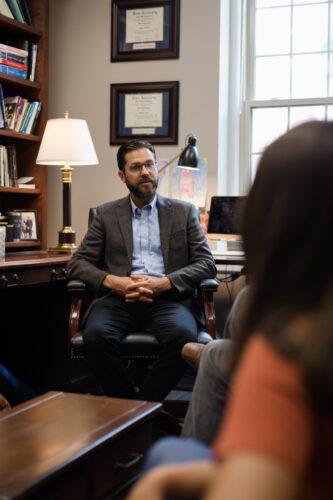 “Being a part of this community and learning from Dr. Inman shapes the way Caden and I serve and do ministry,” commented Jessica. “As we help teach seventh graders at church and we talk with them about the Trinity, we get to apply and translate some of the lessons we’ve learned and pour into their lives, which has been so encouraging.”
“Being a part of this community and learning from Dr. Inman shapes the way Caden and I serve and do ministry,” commented Jessica. “As we help teach seventh graders at church and we talk with them about the Trinity, we get to apply and translate some of the lessons we’ve learned and pour into their lives, which has been so encouraging.”
For Inman, Chris, Caden, and Jessica, being part of Southeastern’s Great Commission community is about so much more than just sharing the gospel. Great Commission community involves becoming Great Commission Christians who share the gospel because the gospel has deeply transformed who they are.
“I’ve learned that being a student at a Great Commission seminary not only involves the external component of sharing the gospel but also requires introspection and attention to the kind of person you are becoming,” shared Caden.
Faithfulness to the Great Commission must begin with personal formation and discipleship. That is why life in Southeastern’s Great Commission community involves deep intellectual and spiritual formation in Christ that then launches students into Great Commission obedience.
“Kingdom people do kingdom things,” noted Inman. “Too often we try to get people to do kingdom things when they haven’t been gripped by the kingdom, which only burdens people with guilt. Instead, they need to cultivate a kingdom heart and mind, which is the first step to doing kingdom works. Cultivating a kingdom heart and mind is an essential part of fulfilling the Great Commission.”